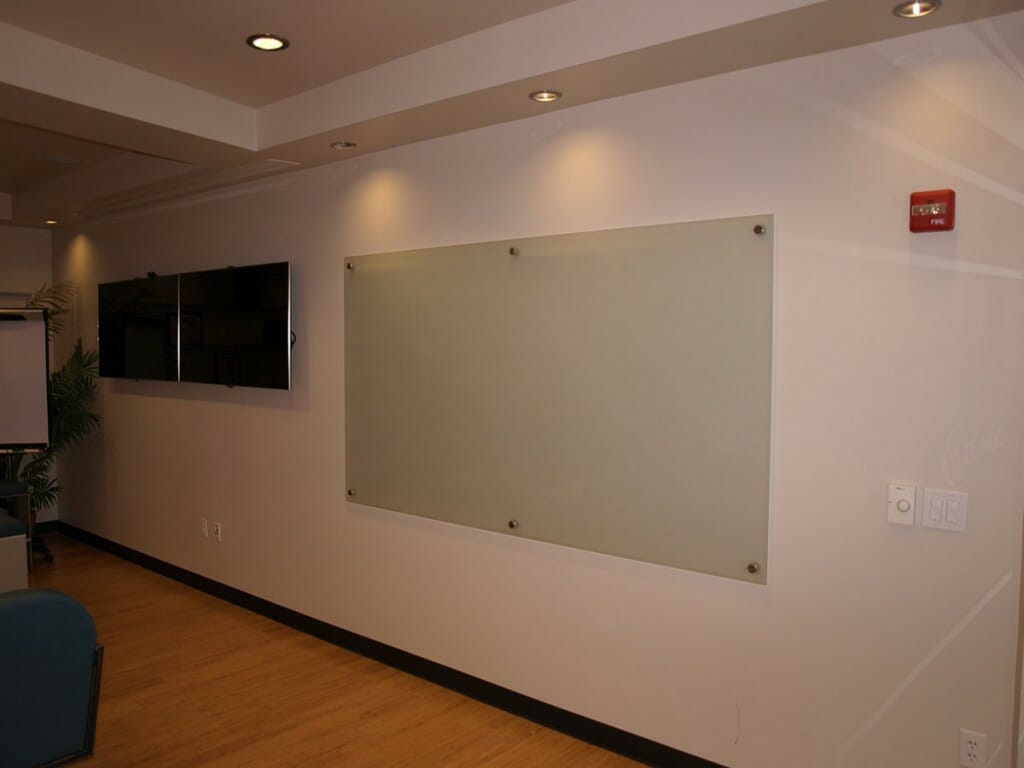
Forget the musty old blackboards and the stained whiteboards from your days as a school child. Glass whiteboards are the writing medium every organization needs for presentation displays. While the glossy dry erase boards replaced the dust-filled blackboard, their hard-to-erase streaks made group writing unnecessarily difficult. The latest glass whiteboards improve upon these traditional designs by eliminating chalk dust, reducing allergies, and improves long-distance visibility.
As the newest innovation on the market, it is easy to see why schools and businesses opt for glass whiteboards over the less desirable options. Many companies use glass whiteboards during stand-up meetings, client presentations, and remote discussions while teachers use them frequently in school settings as they teach students new concepts.
If you still don’t understand what all the glass whiteboard hype is all about, Sawyer Glass, a Utah glass company, answers the most frequently asked question in our glass dry erase board guide.
What is a Glass Whiteboard?
Glass whiteboards are made from tempered glass that can withstand more stress than other glass varieties. There are a few different types of glass that manufacturers will use to create a glass whiteboard, including:
● Melamine
The cheapest glass whiteboards on the market, melamine whiteboards are made of resin-infused paper and substrates. The quality of melamine glass whiteboards varies depending on the substrates and amount of resin used. The more resin used also impacts the whiteboard’s stain-resistance. While these glass dry erase boards work well on some occasions, they are also more prone to wear-and-tear than those made from different glass.
● Painted Steel or Aluminum
Glass whiteboards made from steel use a metal sheet backing with a multi-layer coating of colored glass base and a clear layer that acts as its surface. Quality painted steel and aluminum whiteboards work well but may scratch or dent when inappropriately used.
● Porcelain Enamel-Coated Steel
The highest quality glass whiteboard on the market, porcelain whiteboards consist of steel boards with a ceramic coating. These whiteboards are also highly scratch-resistant, making them the best option for industrial and classroom settings.
No matter which option you select, a customized glass whiteboard is typically easier to clean, more stain-resistant, and stronger than traditional whiteboards. The glass component of these whiteboards also blends seamlessly with any décor, making it one of the versatile items to install in a commercial or educational space.
Are Glass Whiteboards Any Good?
Glass dry erase boards offer superior aesthetics to all its competitors. Along with the obvious visual appeal, glass whiteboards function extremely well, holding up to stains, streaks, and ghosting. Unlike traditional whiteboards made from a pressboard of mixed woods, glues, and chemicals, glass whiteboards have a simplified formula that is more environmentally-friendly and sanitary. The top coating even allows small scuffs and scratching without accumulating bacteria and other allergens.
Do Whiteboard Markers Work on Glass?
Yes, you can write on a glass whiteboard with a dry erase marker without any staining. You can also use a variety of markers on a glass whiteboard, including those specifically designed for glass dry erase boards, such as liquid chalk markers and liquid paint markers. Our glass specialists recommend that you don’t leave the markings on the glass whiteboard for long periods, as it will be harder (but not impossible) to erase.
Are Glass Whiteboards Magnetic?
Stop losing whiteboard markers and gathering office clutter—place magnets on your glass whiteboard surface for easy storage and organization. The latest glass whiteboards offer magnetic capabilities thanks to a strong steel backing. The magnetic process involves laminating a steel sheet to the back of the tempered glass. However, the thickness of a glass whiteboard can impede ordinary magnet capabilities. Fortunately, neodymium or rare earth magnets work well on glass dry erase boards. Working with a glass specialist, you can discuss which magnetic glass whiteboards to install in your school, business, hospital, or factory.
How to Clean Glass Whiteboards
While glass whiteboards will never stain or streak like traditional whiteboards, regularly cleaning the surface will keep it looking shiny and new. Although we highly recommended that you consult your glass company or read the manual, here are a few tips to use while cleaning your glass dry erase board.
- ● Clean your glass whiteboard using materials that are clear of any debris to avoid scratching the glass surface
- ● Clean your glass when it is at a cool temperature, as cleaning it while it is hot or in direct sunlight could damage the glass.
- ● Use a mild detergent or specialty glass solution when deep cleaning your glass dry erase board.
- ● Whenever erasing markings or cleaning your glass whiteboard, our specialists recommend using a soft cloth or towel.
- ● Avoid leaving tapes or adhesives on your glass surface as they are extremely difficult to remove. If you are attempting to do so, consult with a glass specialist to avoid scratching the glass.
Glass Whiteboard Services at Sawyer Glass
Take your space to the next level with a custom whiteboard from the Utah custom glass company Sawyer Glass. Conveniently located in Salt Lake City, Sawyer Glass offers various glass materials to ensure that your glass dry erase board meets all of your needs. With a clear appearance that doesn’t stain the same way that a traditional whiteboard does, our custom glass whiteboards will become the item that you wish you had bought sooner.